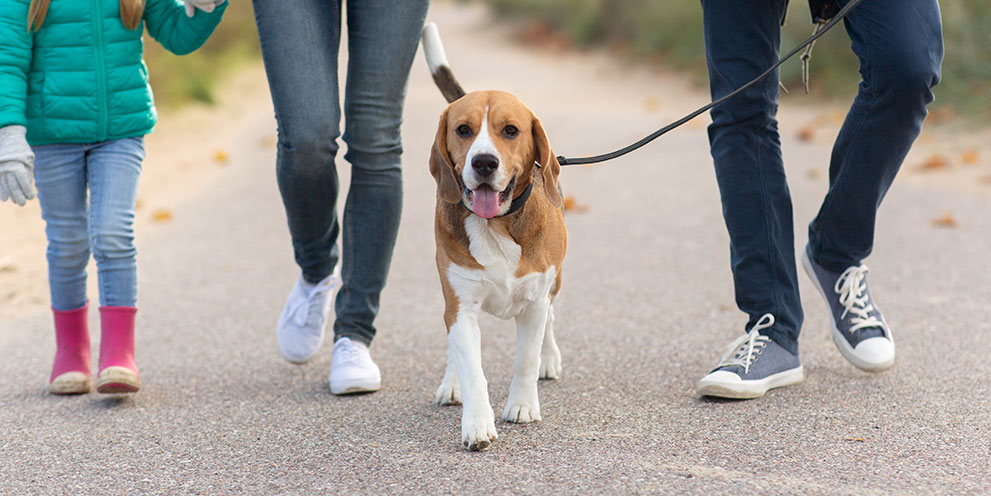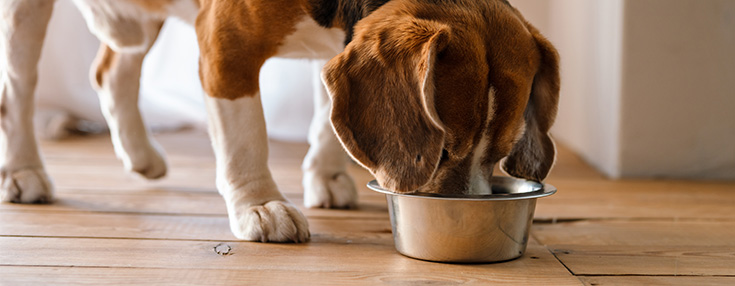
Dog breed - Beagle
Beagle
The smallest of the Hound group, Beagles are fun-loving, active dogs that love to be kept busy.
Beagles at a glance
Alert, loving, intelligent
1-2 hours of exercise a day
Life expectancy of 12+ years
Medium, between 9kg and 14kg
The personality and temperament of Beagles
Originally bred as hunters, Beagles would spend their days working, mainly following scents. With a big heart to match their big ears, Beagles are agile and intelligent companions.
They're naturally very curious and playful dogs, so tend to be the right fit for families and those with active lifestyles.
Usually, Beagles get on very well with other dogs so could make a great addition to a household that already has pets.
As Beagles are highly intelligent dogs, they're not keen on being left alone for long periods or without any mental stimulation. Not enough exercise could also cause behavioural issues. Many dogs, especially high-energy breeds, become bored and frustrated if they don't get enough outdoor exercise and mental stimulation.
Consider things like lick mats, puzzles, frozen treats and scent games to keep them busy.

How to train and exercise your Beagle
Beagles are inquisitive and energetic, so they need plenty of stimulation (both mental and physical) to keep them happy and healthy.
Fully-grown Beagles need around one to two hours of exercise a day. They also need lots of mental stimulation and playtime when they're at home, whether that's puzzles, lick mats or training.
You should start training them as early as possible to get them into the right habits from the offset. This should include introducing them to other dogs, people and lots of new experiences.
Also, Beagles naturally love a little attention and are prone to barking when they get overexcited! You can reduce this with the right training but bear in mind that it's completely normal behaviour for them to be vocal.

Common health conditions in Beagles
Some common health conditions in Beagles are:
- epilepsy - this can involve seizures, and the symptoms usually start at around two years old
- hypothyroidism - this is especially common among older Beagles and symptoms can include hair loss, dry skin and sluggishness
- cherry eye - this is when a dog's eyelid becomes swollen and gets stuck partially outward
- intervertebral disc disease (IVDD) - this is a spinal condition that can lead to some mobility issues
- ear infections and skin allergies - their allergies can be brought on by things they eat, touch or inhale (for instance, pollen)
These conditions can be treated or at least managed with medication, exercise or possibly surgery. As with all dogs, Beagles can get ill or injured and it's a good idea to have some pet insurance in place to help with the cost of vet bills.
Feeding and nutrition
Like all dogs, Beagles need a healthy, balanced diet. They need two meals a day with plenty of nutrients to keep them on top form, depending on their age, size and any existing health concerns.
They can put on weight quite quickly, so it's important to keep an eye on their portion sizes and any extra treats to make sure they're not overeating.
If your Beagle is a puppy, they can be slightly more prone to tummy troubles. Make sure you space out mealtimes and exercise, and be careful not to overfeed them (obesity is common with Beagles).
If you're not sure about what food you should be giving your furry friend, check in with your vet to get their recommendations.
Grooming your Beagle
Beagles have a short, waterproof coat and don’t shed a huge amount. They only need brushing around once a week with a soft-bristle brush to remove any excess hair and keep them looking sleek.
Although their floppy ears are part of what makes them so cute, they can make them prone to ear infections as they reduce the airflow into their eardrums.
So, it's a good idea to make regular ear checks and cleaning a part of their grooming routine. Look for any excess, dark-coloured wax or a bad smell.
You can clean the outer part of their ears by using damp cotton wool to gently clear any excess dirt or wax from their outer ears. Then use a recommended ear cleaner from a vet to insert some drops into their ear canal.
If they do have an ear infection, it's always best to chat to your vet about recommended medicines and what to do next.

Things to know before you buy or rehome a Beagle
Whether you're getting a puppy from a breeder or adopting an older dog, it's best to be prepared. Make the transition easier by getting the following ready before you bring them home:
- Decide the best diet for your dog and get some food in stock.
- Buy the essentials, including a collar, ID tag, lead, bowls and a bed.
- Learn about their grooming needs and buy a brush or other necessities.
- Prepare your home. Beagles are scent hounds so make sure you remove anything you don't want them to get hold of!
- Discuss puppy or dog rules with your family and come up with a routine.
- Make sure your garden is secure - this is especially important with Beagles as they love to dig and climb.
- Beagles need lots of exercise and play time. Research their exercise needs and plan some socialisation.
- Look at pet insurance options.
Did you know?

Insuring your Beagle
Find out more about protecting your Beagle.